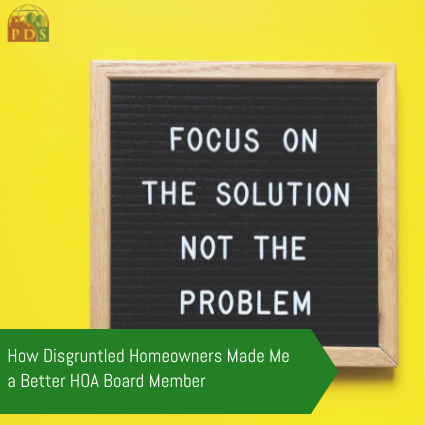
How Disgruntled Homeowners Made Me A Better Board Member
Nobody really looks forward to an angry voicemail about a barking dog, or a disgruntled homeowner venting about assessments at a board meeting….
But, those interactions and others like them could actually be quite beneficial – good for both the health of your HOA board and your personal growth and development.
Margaret Heffernan, an international entrepreneur, CEO, and author of the award-winning “Willful Blindness,” discussed this phenomenon in her TEDGlobal talk, “Dare to Disagree.”
Heffernan shared the story of Dr. Alice Stewart, a doctor and epidemiologist who researched the relationship between radiation and childhood cancers in 1950s Britain. Dr. Stewart’s research partner, statistician George Kneale, considered it his job “to prove Dr. Stewart wrong” – challenging her findings at every step.
“It was only by not being able to prove she was wrong that George could give Alice the confidence she needed to know she was right,” Heffernan says. “It’s a fantastic model of collaboration – thinking partners who aren’t echo chambers.”
Encouraging the expression of different points of view can lead to a healthier, happier homeowners association in the long-term.
- It can prevent single-mindedness in your HOA. Individual homeowners may have concerns that aren’t readily apparent to the board or the rest of the homeowners. Those insights could be important for the group as a whole, and considering them can prevent the “echo chambers” that Heffernan warns about.
- It can provide a system of checks and balances. No one is above accountability; sometimes even the most responsible and diligent board member can show a lapse in judgment. It’s good for everyone, including the board member, to have homeowners who are willing to speak up if that happens.
- It can foster a culture of open communication. When other homeowners see that healthy dialogue is encouraged, they may be more willing to get involved and share their own insights.
Of course, disgruntled homeowners may not always voice their concerns in positive, constructive ways. There are many professional resources that offer tips on dealing with those and others in your association, such as the Community Association Institute’s “Pearls of Wisdom” guidebook. Just remember that even the most challenging personality among them can provide opportunities for growth and progress.
